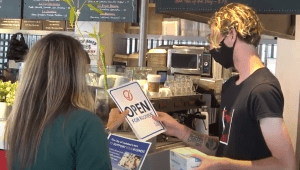
DAVID GRAHAM
CHIEF INNOVATION OFFICER
CITY OF CARLSBAD
The COVID-19 pandemic has brought significant changes to the way America works, starting with the millions of people who are working from home, many for the first time, and escalating to the rapid development of tools and techniques that make productivity possible in a transformed world.
The mark of any good business is its ability to adapt to changing conditions, and this is no less true for cities.
Before COVID-19 struck, forcing many businesses to adjust to remote work overnight, many tech companies were already making that shift, instituting new and more flexible ways of work that embraced digital collaboration and telecommuting. Whether used as a perk to attract talent that are productive wherever they are, to reduce office space costs, or because a company’s workforce is distributed around the globe, the adoption of remote work continues to grow.
The City of Carlsbad was embracing this trend too, already planning and implementing changes to carry us forward into a more digital future. Prior to the pandemic, we were shifting more services online, collaborating virtually, and developing a remote work policy. To paraphrase Oscar Wilde, we expected the unexpected – so when COVID-19 forced change on the way we do businesses – we did what a lot of our Carlsbad businesses were already doing. We adapted and accelerated adoption.
Everything we are doing is driven by a desire for continuous improvement in how we optimize services for our residents and support our businesses. We continue to put more services online, such as utility billing, which previously consisted of paper billing and the U.S. Postal Service. This adaptation aligned with the onset of the COVID-19 shutdown and allowed the city to turn-on this service at the time our residents and businesses needed it most.
Already on the roadmap to make it easier to do business in the city, more permits have shifted online, virtual tools are being used for inspections and simple permits, like water heaters permits, are being processed more conveniently using digital tools.
As the health emergency moved into a prolonged a shutdown with shelter-at-home requirements and public health orders, our team didn’t skip a beat. We found innovative ways of continuing to operate, including public facing services moving online. From a virtual egg hunt to virtual summer reading program, our parks and recreation and library and cultural arts teams have found ways to continue to deliver services digitally.
Through all of this, the business of government has continued, albeit in a little different form.
Public meetings of the City Council, Planning Commission and all other boards and commissions shifted to digital meeting platforms, like Zoom and Microsoft Teams that allowed for transparency and safe, remote-access for residents. The city also implemented small changes, such as touchless crosswalk signals at some high-use intersections.
Realizing that the business community was hard hit by loss of revenue, the city established a $5 million economic revitalization package to help affected businesses. Most of that fund, $4.4 million is funding a micro loan and recovery loan program for Carlsbad small businesses.
The city isn’t stopping there. As more businesses are allowed to open, we continue to collaborate with the Carlsbad Chamber of Commerce and Carlsbad Village Association on a responsible reopening approach. Restaurants and retailers can apply to use public sidewalks and private parking lots for expanded operations. City staff and volunteers distributed “We’re Open” signs and tens of thousands of masks to show that together, we can create an environment that keeps our residents and visitors safe.
Returning to the old way of doing business and ignoring the innovative advancements that have been made in our city and in our businesses through this ordeal would be a disservice to the hardships we have endured. The city must and will pursue pivots to better serve our residents and businesses at the highest level. For the city, its employees, our residents and businesses, we will come through this crisis transformed and better equipped than ever to be a community that embraces change and grows through adversity.
